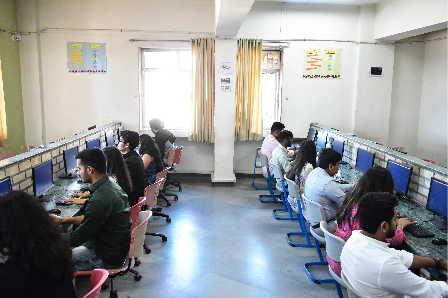Announcement
Get Ready for INDUS CUP 2K26! | Dates: 5–10 January 2026 | Stand a Chance to Win Cash Prizes up to ₹10,00,000!...Read more Get Ready for INDUS CUP 2K26! | Dates: 5–10 January 2026 | Stand a Chance to Win Cash Prizes up to ₹10,00,000!
We are excited to announce the Indus Hackathon 2025, an exhilarating one-day event organized by the CSE Department of Indus University....Read more We are excited to announce the Indus Hackathon 2025, an exhilarating one-day event organized by the CSE Department of Indus University.
26th ISTE Faculty Annual State Convention will be held at Indus University on April 27, 2023....Read more 26th ISTE Faculty Annual State Convention will be held at Indus University on April 27, 2023.
Get Ready for INDUS CUP 2K26! | Dates: 5–10 January 2026 | Stand a Chance to Win Cash Prizes up to ₹10,00,000!...Read more Get Ready for INDUS CUP 2K26! | Dates: 5–10 January 2026 | Stand a Chance to Win Cash Prizes up to ₹10,00,000!
We are excited to announce the Indus Hackathon 2025, an exhilarating one-day event organized by the CSE Department of Indus University....Read more We are excited to announce the Indus Hackathon 2025, an exhilarating one-day event organized by the CSE Department of Indus University.
26th ISTE Faculty Annual State Convention will be held at Indus University on April 27, 2023....Read more 26th ISTE Faculty Annual State Convention will be held at Indus University on April 27, 2023.
The Bachelor of Science (Honors) in Mathematics at Indus University is a comprehensive four-years undergraduate program designed to equip students with the interpretive, analytical, and logical skills essential for excelling in the field of Mathematics. This program is meticulously structured to challenge students with both concrete and abstract problems, honing their critical thinking and problem-solving abilities.
Alignment with Entrance Exams: The curriculum is aligned with the latest syllabi of higher education entrance exams such as JAM, GATE, NET, etc., preparing students for postgraduate studies and research careers in mathematics.
Career Prospects: Graduates of the B.Sc(Hons.) in Mathematics program have a wide array of career options across various fields, including:
This degree opens doors to vast opportunities, enabling graduates to become leading professionals in their chosen fields. Whether aiming for careers in academia, industry, or research, students of the B.Sc.(Hons.) Mathematics program at Indus University are well-prepared to meet the challenges and demands of a rapidly evolving world.
The Key highlights of the B.Sc.(Hons.) Mathematics program at Indus University are as follows.
The Program Educational Objectives (PEOs) and Program Outcomes (POs) of the B.Sc.(Hons.) in Mathematics course at Indus University are carefully designed to prepare students for a broad range of professional and academic challenges. Here’s an overview reflecting the aspirations and expected achievements for graduates of this program:
Students can get online admission based on merit, or they can simply walk in, and after the interaction, they can get approval from Admission Committee.
Pass in 10+2 or equivalent examination with Mathematics, Physics and Chemistry as compulsory subjects from recognized board.
These program outcomes of B.Sc.(Hons.) Mathematics typically includes the ability to:
Together, the PEOs and POs outline a comprehensive framework aimed at producing graduates who are not only proficient in mathematical theories and applications but also equipped with the necessary soft skills, ethical standards, and a lifelong learning attitude to thrive in their professional and personal lives.
Indus University has an independent vertical – Training & Placement Department (T & P Dept.) – that plays the pivotal role of connecting two important ends, vis-à-vis, school and industry. It demonstrates a bridge between schools and constituent associations of the University (input-end at the entry-level) and industry (output-end at the finishing level).
The Training and placement department came into existence in the year 2006. It was initially associated with the Indus Institute of Technology & Engineering and later became a part of the Indus University from 2012 onwards.
Training and placement department is the epicentre for career guidance to students of all programmes and streams pursuing their studies at the University. It offers overall career solutions to the students by guiding them to decide and pursue their dream careers.
What are the subjects one study in B.Sc Mathematics?
The B.Sc Mathematics syllabus contains pure and applied mathematics subjects like Calculus, Matrix algebra, Graph Theory, Algebra, Vector Calculus, Coordinate Geometry, Complex Analysis, Mathematical Analysis, and Differential Equations, among many others.
What is the scope of doing B.Sc Mathematics?
Mathematicians have vast opportunities in academia & industry.
Student can go for teaching, Higher Studies, Research, Subject Matter Expert Industry, Content Developer, IT Industry, Actuarial Sciences, MBA, Investment Manager, Research Labs, Numerical Analyst, Banking Sector, UPSC, Civil Services, Government Service, Space/Aircraft Industry, Operations Research Analyst and Systems Analyst etc.
What are the eligibility criteria for B.Sc Mathematics?
The student must have completed 10+2 in science with Mathematics from a recognized board.
What is the duration for programme B.Sc in Mathematics?
The total duration for B.Sc Mathematics programme is of 3 years, which is divided into 6 semesters.
Is course material provided by the University or the books are included in the fees structure?
Library facility is available, and the course material is uploaded on the ERP.
Is hostel facility available for students of B.Sc?
Yes, Indus University has on campus hostel facilities for both boys and girls.

An imaginative educational plan of this program will empower understudies..